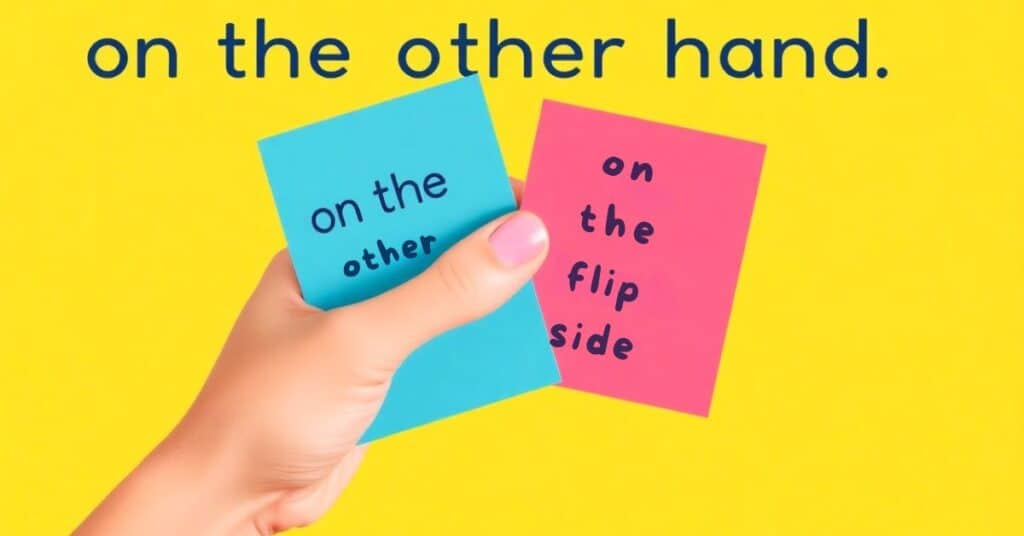Ways to say “on the other hand” can make your conversations and writing feel fresh, dynamic, and engaging. Let’s be real you don’t want to sound like a broken record, repeating the same phrase over and over. Whether you’re debating with a friend, crafting a persuasive argument, or just adding flair to your daily chats, having a variety of alternatives keeps things interesting.
But here’s the fun part you don’t have to settle for boring transitions. I’ve rounded up the best, most versatile phrases that will level up your vocabulary and make you sound effortlessly smooth. Ready to upgrade your word game? Let’s dive in.
1. Conversely: Another Way to Say On the Other Hand
Sounds fancy, right? “Conversely” is your go-to word when you need to sound intelligent without trying too hard. It’s often used to present a contrast in a structured way, making your point feel solid and well thought-out. Whether you’re writing an essay or debating with friends, “conversely” makes you sound like a professional thinker.
Example: I love watching movies at home. Conversely, going to the theater gives me an excuse to eat a bucket of popcorn guilt-free.
2. Then Again: A Casual On the Other Hand Alternative
Perfect for those moments when you’re indecisive but don’t want to admit it. “Then again” is an excellent phrase for casual conversation because it adds a bit of relatability and informality. It works well when you’re weighing options and acknowledging an alternative without sounding too formal.
Example: I could start eating healthy. Then again, pizza exists.
3. On the Flip Side: A Fun On the Other Hand Option

For when you want to keep it casual and cool, like a pro debater who also happens to skateboard. This phrase is great for everyday speech because it’s friendly, informal, and easy to slide into any conversation. It also helps soften a contrasting point so it doesn’t sound too abrupt.
Example: Working from home is nice. On the flip side, my fridge is now my worst enemy.
4. However: A Classic On the Other Hand Substitute
A classic. Reliable. Always there when you need it kind of like WiFi (except when it’s not). “However” is one of the most commonly used words in writing and speech when making a contrast. It’s perfect for formal and informal settings, and it effortlessly makes your sentence feel structured and well-balanced.
Example: The weather is perfect for a picnic. However, I don’t feel like socializing with insects today.
5. That Said: A Smooth On the Other Hand Alternative
This phrase makes it sound like you’re about to drop a wise truth bomb. It works well when you want to acknowledge a point while leading into a counterpoint with a touch of authority. It’s often used to show that while a previous statement is valid, there’s still another side to consider.
Example: Coffee keeps me energized. That said, too much of it turns me into a jittery mess.
6. But at the Same Time: Using On the Other Hand Differently
Great for when you’re torn between two ideas, like choosing between binge-watching Netflix or finally doing the laundry. This phrase acknowledges both sides of an argument equally, making it great for when you don’t want to completely discredit one side.
Example: I should probably sleep early. But at the same time, I need to find out what happens in the next episode.
7. In Contrast: A Stronger On the Other Hand Choice
A formal way to highlight differences without making it sound like a debate club showdown. If you need a structured, logical way to present contrasting ideas, “in contrast” does the job perfectly. It’s frequently used in essays and discussions to showcase opposing points clearly.
Example: Dogs are loyal and affectionate. In contrast, cats secretly judge your life choices.
8. Alternatively: A Versatile On the Other Hand Synonym
Great for options, like deciding between staying in or going out (we both know which one’s winning). “Alternatively” offers a way to introduce another possible idea or choice in a smooth and logical manner. It’s a great word to use when presenting multiple perspectives.
Example: I could go for a run. Alternatively, I could take a nap and dream about running.
9. By Comparison
Because sometimes you just need to pit one thing against another. This phrase helps to show a clear contrast between two ideas, often emphasizing one’s superiority or difference. It’s perfect for making side by side evaluations.
Example: I thought I was bad at cooking. By comparison, my roommate just burned water.
10. From Another Perspective
A solid choice when you’re trying to be all open minded and reasonable. This phrase helps introduce a new way of thinking about something, making it useful for discussions, debates, and problem solving.
Example: Mondays are rough. From another perspective, they’re just five days away from Friday.
11. Looking at It Differently

This phrase is a great way to introduce a fresh take on a situation. Instead of completely opposing a point, it allows you to reframe it in a way that invites more discussion. It’s especially useful when trying to be persuasive in a non-aggressive manner.
Example: Exercising is tiring. Looking at it differently, it’s an excuse to wear comfy gym clothes all day.
12. But Wait, There’s More!
This phrase makes you sound like an infomercial host, but in the best way possible. It adds a fun, dramatic flair to your conversation, signaling that you have an additional, possibly surprising, point to make. It’s great when you want to create suspense or emphasize that you’re not done making your argument yet.
Example: This new phone has a better camera, longer battery life, and but wait, there’s more! It even folds in half like a futuristic sandwich.
13. Not to Mention
This phrase is useful when you want to casually throw in an extra detail without making it seem like a big deal. It works well in both casual and formal discussions and helps introduce supporting arguments or side notes in a smooth, natural way.
Example: The hotel had a beautiful view and excellent service, not to mention a breakfast buffet that could feed a small army.
14. Nevertheless
A strong, sophisticated way to present a contrasting idea while maintaining a smooth flow. It signals that even though one point may be true, there’s still another perspective worth considering. Great for writing and formal speech.
Example: I’m terrible at dancing. Nevertheless, I’ll still be the first one on the dance floor.
15. Yet
A short but impactful word that introduces contrast without being too heavy. It’s useful when you want to present a contradiction in a simple yet effective way.
Example: I hate waking up early. Yet, I love the smell of morning coffee.
16. Still
“Still” is a short yet powerful way to introduce a contrasting point. It implies persistence or a lingering thought that refuses to be ignored. It’s ideal for moments when you want to acknowledge an existing idea but present a valid counterargument that needs attention.
Example: The concert tickets were expensive. Still, seeing my favorite band live was worth every penny.
17. Even So
This phrase helps to acknowledge one idea while bringing up another that slightly contradicts it. It’s often used to introduce an unexpected perspective, making conversations more interesting.
Example: The weather forecast says it’ll rain. Even so, I’m bringing my sunglasses just in case.
18. Mind You
This phrase adds emphasis and a bit of personality to your statement. “Mind you” works well when you want to make sure your listener fully understands the importance of what you’re saying. It adds a conversational, slightly cheeky tone that makes your speech more engaging.
Example: I usually avoid spicy food. Mind you, I’ll make an exception for the right kind of tacos.
19. At the Same Time
A great phrase for when you want to acknowledge two opposing ideas simultaneously. It helps balance your argument without completely dismissing one side. It’s perfect for nuanced discussions where both sides have merit and you want to present them fairly.
Example: I love working remotely. At the same time, I miss the social interactions of an office environment.
20. To Put It Another Way
Sometimes, people need a different perspective to understand what you’re saying. This phrase is useful when you want to clarify or simplify a point without changing its meaning. It’s great for ensuring your message is received in the way you intend.
Example: The instructions were too complicated. To put it another way, assembling this furniture feels like solving a puzzle with missing pieces.
Bonus Alternatives
Since you stuck around this long, here are a few extra options for variety:
- On Second Thought “I was going to the gym. On second thought, I’ll stay home.”
- All the Same “I don’t like horror movies. All the same, I still watch them with friends.”
- Then There’s “I love winter. Then there’s the whole scraping ice off my windshield thing.”
- But Consider This “Dogs are amazing pets. But consider this, they also eat your socks.”
- Flipping the Script “I hated math in school. Flipping the script, I now use it daily.”
Wrapping It Up
There you have it 20+ ways to say “on the other hand” without sounding like a broken record. Whether you’re writing, debating, or just trying to sound a little more sophisticated in everyday conversations, these alternatives have you covered.
Got a favorite from the list? Or do you have a go-to phrase I missed? Drop it in the comments (or, you know, just tell your cat whatever works for you).

Carla Smith is an expert blogger specializing in English grammar and vocabulary, dedicated to simplifying language learning through insightful tips and engaging content.






